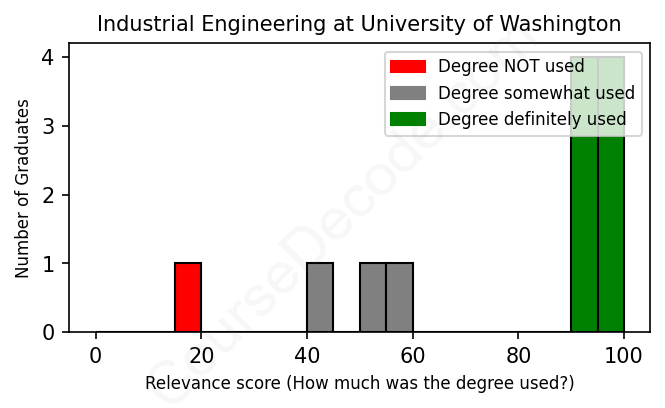
First, some facts. Of the Industrial Engineering graduates from University of Washington we've analyzed , here's how many have used (or NOT used) their degree in their career:

These are estimates based on AI analysis of 12 LinkedIn profiles (see below).
The verdict? Significantly above average. Overall, with an average relevance score of 78%, Industrial Engineering graduates from University of Washington have a much higher likelihood (+11%) of finding work in this field compared to the average graduate across all fields:
And for comparison, here's the chart for all profiles we've looked at across all degrees.
Also, after graduating, 41% of these graduates have pursued further education other than another Bachelor's degree (such as a Masters degree or other), compared to the average across all profiles of 35%. This suggests you may need more than just a Bachelors degree to be competitive as a Industrial Engineering graduate.
See the details:
|
Relevance score: 92% We think this person has gone into a career highly relevant to their degree. We think this person has gone into a career highly relevant to their degree.
DEGREE INFOGraduated in 2021 from University of Washington with a Bachelor of Engineering - BE in Industrial Engineering. No other secondary education since. JOB HISTORY SINCE GRADUATIONSystem Engineer- UW Capstone Project Starbucks Jan 2021 - Jun 2021 Industrial Engineer  Boeing May 2022 - May 2023 Industrial Engineer ll  Boeing May 2023 - Present ABOUTNo information provided. |
The top 10 most common jobs done by the graduates we've analyzed (ranked most common to least) are:
When looking at the job history of University of Washington graduates with a degree in Industrial Engineering, we see a mix of roles, but a lot of them are very much aligned with their studies. A good chunk of these graduates lands positions like Industrial Engineers, Manufacturing Engineers, and Project Engineers, which dive deep into the core engineering principles learned during their studies. These roles require skills in process optimization, systems thinking, and project management, so they're pretty spot-on in terms of relevance. Companies like Boeing and Terex are popular employers in this circle, which shows that there's a strong industry connection for these graduates.
However, not every position aligns perfectly with what they studied. Some graduates head into roles like Business Analysts or Project Managers, where they might use skills that overlap with industrial engineering but don’t directly apply every technical aspect. For instance, roles in data analysis or even management position them outside of the traditional engineering track, even if they still require some analytical thinking. So, while many of these jobs are relevant to their degrees, there’s a noticeable spectrum of how closely aligned some positions are to the actual Industrial Engineering curriculum.
Here is a visual representation of the most common words in job titles for Industrial Engineering graduates (this is across all Industrial Engineering graduates we've analyzed, not just those who went to University of Washington):

Looking at the career trajectories of University of Washington graduates who studied Industrial Engineering, it’s clear that many of them start with solid positions straight out of college. Most of these graduates land roles as industrial engineers or business analysts, often in big companies like Boeing or Amazon. Initially, they're involved in internships or entry-level engineering positions, which gives them real-world experience and helps them build a valuable skill set relevant to their studies. It’s pretty impressive to see how these early careers lead to roles that are closely tied to their degree, like project management, engineering, or analytics, often within just a few years of graduation.
Fast forward five to ten years, and many of these graduates have moved up the ladder into more senior positions or specialized roles. A significant number have stayed with their companies and transitioned into higher-level roles, such as project managers or senior engineers. Some have branched out into business positions, leveraging their technical expertise in areas like business intelligence or market analysis. While not everyone sticks strictly to engineering—for instance, some go into technical writing or project management—most are still in fields that utilize their Industrial Engineering background. Overall, it looks like these graduates are on successful paths, engaging in careers that are not only relevant but also fulfilling in the long run.
Hey! So, a Bachelor’s degree in Industrial Engineering can definitely be challenging, especially at a school like the University of Washington, which is known for its rigorous programs. You’ll dive into a mix of math, science, and engineering principles, and it can get pretty intense with all the problem-solving and critical thinking involved. It’s not impossible by any means, but you’ll need to stay organized and keep up with the coursework. A lot of students find it manageable if they put in the effort and collaborate with classmates, but it’s definitely more demanding than some other degrees. Just be prepared for some late nights and tough projects!
Most commonly, in the LinkedIn profiles we've looked at, it takes people 4 years to finish a Bachelor degree in Industrial Engineering.
Looking at the career paths of these Industrial Engineering grads from the University of Washington, it seems like they're doing pretty well for themselves. Many of them started with solid internships and quickly moved into stable engineering or management roles, especially at big companies like Boeing and Amazon, which are known for offering competitive salaries and benefits. The later graduates are landing jobs in respected firms right out of school, which suggests a good salary trajectory. Even the ones who freelanced or took project management roles seem to be in decent positions. Overall, while we can't nail down exact figures, the trends indicate that they’re likely earning good money, especially as they move up in their careers.
Here is a visual representation of the most common words seen in the "about" section of LinkedIn profiles who have a Bachelor degree in Industrial Engineering (this is across all Industrial Engineering graduates we've analyzed, not just those who went to University of Washington). This may or may not be useful:

Here are all colleges offering a Bachelor degree in Industrial Engineering (ordered by the average relevance score of their Industrial Engineering graduates, best to worst) where we have analyzed at least 10 of their graduates:
| College | Score | Count |
|---|---|---|
 Iowa State University Iowa State University
|
88 | 11 |
 North Carolina State University North Carolina State University
|
87 | 12 |
 California Polytechnic State University-San Luis Obispo California Polytechnic State University-San Luis Obispo
|
87 | 15 |
 Texas A&M University Texas A&M University
|
83 | 39 |
 Purdue University Purdue University
|
81 | 36 |
 University of Central Florida University of Central Florida
|
80 | 23 |
 Georgia Institute of Technology Georgia Institute of Technology
|
80 | 59 |
 Penn State University Penn State University
|
79 | 16 |
 Texas Tech University Texas Tech University
|
79 | 10 |
 University of Pittsburgh University of Pittsburgh
|
79 | 15 |
 University of Washington University of Washington
|
78 | 12 |
 University of Arkansas University of Arkansas
|
78 | 11 |
 University of Wisconsin-Madison University of Wisconsin-Madison
|
76 | 13 |
 University of Illinois at Urbana-Champaign University of Illinois at Urbana-Champaign
|
73 | 15 |
 West Virginia University West Virginia University
|
71 | 19 |
 Clemson University Clemson University
|
69 | 23 |
 University of Florida University of Florida
|
64 | 11 |